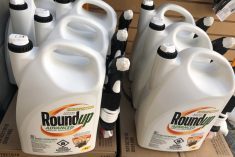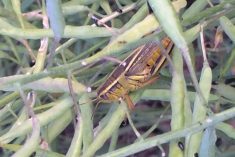Health concerns raised during the federal re-evaluation of Nufarm’s pre-seeding burndown herbicide Amitrol 240 have led the company to stop selling the product for nearly all uses in Canada, starting later this summer.
The company said Wednesday it will retire Amitrol — a non-selective Group 11 liquid whose active ingredient, amitrole, has been on the market for over half a century — and replace it with newer chemicals for pre-seeding burndown.
In a release, the company’s commercial managers said Nufarm has made “an independent decision” to stop making Amitrol and have it off the market by the end of the year.
Read Also

Senft to step down as CEO of Seeds Canada
Barry Senft, the founding CEO of the five-year-old Seeds Canada organization is stepping down as of January 2026.
An expiry date for Amitrol’s registration “has not been established,” the company said, adding it will sell Amitrol until July 29, after which it will be available through Canadian retailers only until all current stock is sold.
Nufarm’s decision follows a re-evaluation proposed in 2012 and released in mid-2014 by Health Canada’s Pest Management Regulatory Agency (PMRA).
PMRA said it would only continue Amitrol’s registration for use on spruce bareroot seedbeds, for which it had been registered under the User-Requested Minor Use Label Expansion program.
Out of all the product’s registered uses, the PMRA said, Amitrol’s use on spruce bareroot nursery stock was found to have value and “does not present an unacceptable risk to human health or the environment when used according to the revised label statements.”
For its other uses, however, the agency said “human health risks of concern have been identified,” including occupational non-cancer risks to handlers and post-application workers, as well as dietary cancer risks from residues in treated crops and drinking water.
The product had been approved for pre-seeding use on wheat, barley, canola, field pea, corn, soybeans and whitebean fields and short-rotation intensive-culture poplar — and also for post-planting uses in apple orchards, pastures and shelterbelts and on non-crop land such as ditches and roadsides.
In its re-evaluation, the PMRA cited cancer concern based on increased incidences of liver tumours in mice, and thyroid and pituitary tumours in rats, and an increase in the incidence of “cranial malformations” when the chemical was administered to pregnant rabbits.
PMRA previously noted during its re-evaluation process that Amitrol had already been banned from pesticide use in Norway and Sweden since 1972 and in Finland since 1980, citing risks to human health, including cancer risks.
Amitrol 240, Nufarm said, was billed as a “go-to” product against weeds such as glyphosate-resistant fleabane, glyphosate-resistant volunteer canola, giant ragweed, cleavers and dandelions.
The product, on the market in Canada since 1959, was also used to burn off horsetail, clover and alfalfa in pasture renovations.
With no registration expiry date yet set, Amitrol’s sales by distributors and retailers — and the product’s use with the registered label for crop and non-crop sites — “can continue for a period of some years,” Nufarm said.
The company said it will replace the product in the pre-seed weed control market with “newer chemistry” — specifically, its BlackHawk and Valtera brands, for use on cereal and soybean fields in Eastern Canada, and BlackHawk, Conquer, GoldWing and Valtera for use on cereal, canola, pulse and soybean fields in the West. — AGCanada.com Network




















